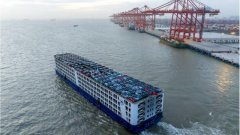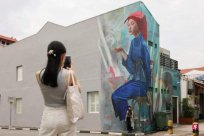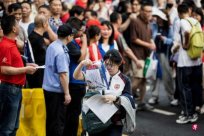People have the nature of profit -seeking and avoiding harm. If a country makes people more at ease and a sense of destination, then whether it is the bottom of the country or the elite, it will strive for it.Conversely, they will only escape.Based on this, I think the flow of population can comprehensively reflect the impact of a country in the field of economy, knowledge, culture and other fields.
Recently, Graham Allison, a professor at the Kennedy Government College of Harvard University, published an article in the United States Foreign Policy Magazine, what can you learn from Singapore?Singapore and two countries held in 2024 — the United States and the United Kingdom — compared, and evaluated the three aspects of "to improve the living standards of most people and realize the greatest degree of personal freedom of the freedom of other people in the society"How do you do.Elison believes that these transcripts are enough to bring a lot of inspiration and reflection to the United States and the West.
In fact, many successful experiences in Singapore are not unique to Western learning, and it is also worth learning in China.For example, the concept of governing the country and the concept of governing the country and the sense of responsibility brought to it brought to it brought to it, which brings to it, is worthy of China to reflect and learn from.
In 1959, when the Singapore government took the autonomy from the British colonists, the housing conditions were extremely bad.More importantly, Singapore was often accompanied by racial conflicts and chaotic situations.According to legend, in 1964, the year before the Singapore's independence of the Federation of Malaysia, one day, Singapore's founding father, Lee Kuan Yew passed through a street, encountered a group of mobs fighting, and suddenly he found that a person hurried down from the upstairs.Taking up a very old motorcycle upstairs, it turned out that he was afraid that the mob's atrocities would affect his dilapidated motorcycle.
This scene made Li Guangyao feel sorry: This person has a small broken motorcycle knowing protection. If every family in Singapore can have a house and have assets, they should not riot.Without a riot, will the society stabilize?IntersectionAs soon as the society is stable, is the economy developed?IntersectionIn this way, social stability and economic development can be virtuous.Therefore, Li Guangyao believes that in order to stabilize the society and economic development, the first thing to do is to make all the proletariat into a production class.(Quoted from Singapore under the rule of Yu Chunjiang Li Guangyao: The guarantee of guaranteeing the sense of belonging to the Central Party School's reporting Times)
The legendary motorcycle incident is true and cannot be examined.But one thing is the fact that Li Guangyao really thinks so.He himself wrote: "After independence in 1965, I felt uneasy about Singapore's voters in the center of the urban area. I noticed that voters in the capitals of various countries always tend to vote against the government, so I am determined to let Singapore families have myself to have myself.Otherwise, politics will not be stable.If you are a house, then, sooner or later, they will conclude that what they defend is the property of the rich. "
After comparing analysis, he felt: "When I found that people have a completely different attitude towards the housing and leasing units they have, they are convinced that a person's property rights are inherent.Establishing a interest relationship between each citizen and the future of the country ... The owner is proud of being able to buy a house, and the cheap rental group of government allowances is seriously abused and the maintenance is bad.They all have their own housing, and the state will be more stable. "
The "resident has its own house" plans.Obviously, Singapore's promoting residents have their housing policies, and more from the political level, the starting point is to build the interest relationship between each citizen and the country's future through everyone with house property rights, so as to seek social stabilityProsperity.Regarding this, Li Guangyao's successor Wu Zuodong also thinks so.In 1995, then Prime Minister Wu Zuodong made it clear in his speech: "Our government's policy is to allow every Singaporean to have his own vital interests in his own country. We must give every Singaporean to own thisPart of the country makes them feel that they are the masters of the country and always have a sense of responsibility for the country .......... Their best vital interests are here to have a set of government housing or a private house."(Yu Yongxue Singapore's housing policy and its revelation to China)
This shows that from the perspective of Singaporeans, housing problems are not simply economic problems, or even simple people's livelihood problems, but must rise to the level of national security and stability, the people's sense of belonging and responsibility to the people's sense of belonging and the sense of responsibility.Political issues.
Different from Singapore, the reason why China has promoted real estate reform is just economic consideration, just want to find new economic growth points.Development and reform Blue Books and China Economic Development and System Reform Report: The 30th year of China's reform and opening up (1978-2008), when reviewing the reform of the Chinese real estate market reform, once said: "In 1996, in order to cope with the emergence of Singapore's economy, it did not appear in Singapore's economy.The prosperity began to propose and find new economic growth points.In September 1997, the 15th National Congress of the mainland government proposed to actively cultivate new economic growth points.In July 1998, the State Council issued a notice on further deepening the reform of the urban housing system and accelerating housing construction, and clearly stated that ‘promoting the housing industry to become a new economic growth point’."
Based on the differences in the above understanding, when China promotes housing reform, it is basically a strategy of shaking the shopkeeper, which completely pushes the responsibility of the residential house to the citizens.As a result, in the past 20 years, China's housing policy has not only deepened the people's sense of belonging and responsibility to the country, but instead complains; on the contrary, the housing policy and household registration system have exacerbated the opposition between urban and rural residents; on the contrary, these policies are these policies.Dull the interests between citizens and the future of the country, and reduced the people's sense of belonging and responsibility for the country.
Earlier in the early years, China's real estate was so hot that when the purchase restriction policies were sacrificed in various places, a paragraph had been circulating on the Chinese Internet: a reporter interviewed a migrant worker and asked him if he was willing to go to the front line to participate in the war.This migrant worker did not answer the question directly, but asked: Is there a household registration restriction on the front line?Is it okay for rural household registration?Is it a person in Beijing and Shanghai's hukou priority to the battlefield?Do you want to temporarily reside?Do you want to go to the job certificate and health certificate?Do you want to have a family planning certificate?Do I need a tax certificate for more than one year?Is there a diploma limit on the front line?Isn't it a party member?I have nothing, and it means that I can’t be advanced.Not a cadre, or a migrant worker, can you go?Also, do you sacrifice everyone a price?When you really fight, are you divided into dual numbers?Do you want to shake the number before the charge?How long can I shake the number?If you are on the battlefield, can you stand behind the urban management and demolition team?If I sacrifice, can my children go to college with Beijing's children?
In modern political society, political jokes, as a social phenomenon, expressing dissatisfaction with the status quo of society, is a popular culture that is "not officially idealized", which reflects the true mentality of the people at that time and the various work of the country.And the true view of career.It connects the public to the political system in a unique "public opinion sensor" form.
From the previously described political jokes, many policies in China have not allowed everyone to feel that they have vital interests in their own country.The government failed to let Chinese people feel part of the country, so that they felt that the country's owner and always had a sense of responsibility for the country.The lack of this sense of nationwide and responsibility has led to the result of China's performance in the soft power.
I published in 2011, did weAvatar: In the book of China's soft power crisis, he tried to define the soft power: The so -called soft power is a fan force, that is, to move itself to call others.Only if you are attractive can you be attractive to others; only when you can move your Chinese people, can you have a appeal to others.It's very simple, how can you really call others if you can't move?
Based on this definition, I have regarded the population as the most reliable indicator that observes the strong and weak power of a country or region -people have the nature of profit -seeking and avoiding harm.There is a sense of destination, so whether it is the bottom of the country or the elite, it will fight for it.Conversely, they will only escape.Based on this, I think the flow of population can comprehensively reflect the impact of a country in the field of economy, knowledge, culture and other fields.
At a recent media round table meeting, Lai Xingxiang, director of Standard Chartered Bank's global international banking business, revealed that Singapore is experiencing the process of "inflowing" of wealth and decreased in "outflow".According to a survey results released by the Gallop investigation agency in 2020, Singapore not only has great attraction to foreign talents, but also avoids the loss of talents to the greatest extent.At present, Singapore is the highest economy in the "potential net talent inflow index" and the highest economy in the world with the highest "potential immigration index".
All these all show that Singapore's housing policy and the concept of governing the country through this are undoubtedly successful, and it is also the most worthy of China to reflect and learn from.
The author is a Chinese economist and a financial columnist




